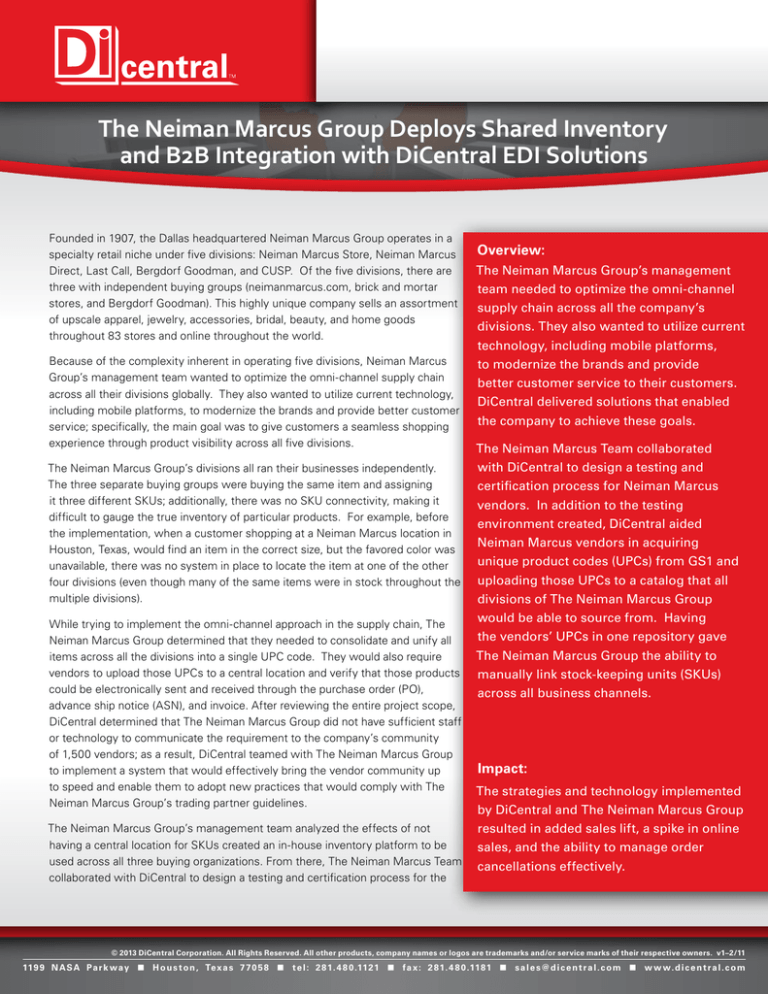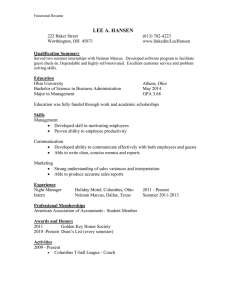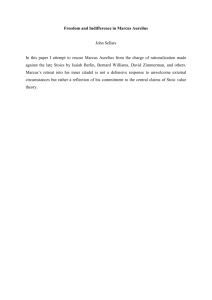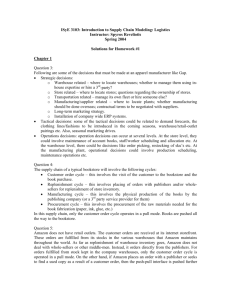
The Neiman Marcus Group Deploys Shared Inventory
and B2B Integration with DiCentral EDI Solutions
Founded in 1907, the Dallas headquartered Neiman Marcus Group operates in a
specialty retail niche under five divisions: Neiman Marcus Store, Neiman Marcus
Direct, Last Call, Bergdorf Goodman, and CUSP. Of the five divisions, there are
three with independent buying groups (neimanmarcus.com, brick and mortar
stores, and Bergdorf Goodman). This highly unique company sells an assortment
of upscale apparel, jewelry, accessories, bridal, beauty, and home goods
throughout 83 stores and online throughout the world.
Because of the complexity inherent in operating five divisions, Neiman Marcus
Group’s management team wanted to optimize the omni-channel supply chain
across all their divisions globally. They also wanted to utilize current technology,
including mobile platforms, to modernize the brands and provide better customer
service; specifically, the main goal was to give customers a seamless shopping
experience through product visibility across all five divisions.
The Neiman Marcus Group’s divisions all ran their businesses independently.
The three separate buying groups were buying the same item and assigning
it three different SKUs; additionally, there was no SKU connectivity, making it
difficult to gauge the true inventory of particular products. For example, before
the implementation, when a customer shopping at a Neiman Marcus location in
Houston, Texas, would find an item in the correct size, but the favored color was
unavailable, there was no system in place to locate the item at one of the other
four divisions (even though many of the same items were in stock throughout the
multiple divisions).
While trying to implement the omni-channel approach in the supply chain, The
Neiman Marcus Group determined that they needed to consolidate and unify all
items across all the divisions into a single UPC code. They would also require
vendors to upload those UPCs to a central location and verify that those products
could be electronically sent and received through the purchase order (PO),
advance ship notice (ASN), and invoice. After reviewing the entire project scope,
DiCentral determined that The Neiman Marcus Group did not have sufficient staff
or technology to communicate the requirement to the company’s community
of 1,500 vendors; as a result, DiCentral teamed with The Neiman Marcus Group
to implement a system that would effectively bring the vendor community up
to speed and enable them to adopt new practices that would comply with The
Neiman Marcus Group’s trading partner guidelines.
The Neiman Marcus Group’s management team analyzed the effects of not
having a central location for SKUs created an in-house inventory platform to be
used across all three buying organizations. From there, The Neiman Marcus Team
collaborated with DiCentral to design a testing and certification process for the
Overview:
The Neiman Marcus Group’s management
team needed to optimize the omni-channel
supply chain across all the company’s
divisions. They also wanted to utilize current
technology, including mobile platforms,
to modernize the brands and provide
better customer service to their customers.
DiCentral delivered solutions that enabled
the company to achieve these goals.
The Neiman Marcus Team collaborated
with DiCentral to design a testing and
certification process for Neiman Marcus
vendors. In addition to the testing
environment created, DiCentral aided
Neiman Marcus vendors in acquiring
unique product codes (UPCs) from GS1 and
uploading those UPCs to a catalog that all
divisions of The Neiman Marcus Group
would be able to source from. Having
the vendors’ UPCs in one repository gave
The Neiman Marcus Group the ability to
manually link stock-keeping units (SKUs)
across all business channels.
Impact:
The strategies and technology implemented
by DiCentral and The Neiman Marcus Group
resulted in added sales lift, a spike in online
sales, and the ability to manage order
cancellations effectively.
© 2013 DiCentral Corporation. All Rights Reserved. All other products, company names or logos are trademarks and/or service marks of their respective owners. v1–2/11
119 9 N A S A P a r k w a y < H o u s t o n , Te x a s 7 7 0 5 8 < t e l : 2 8 1. 4 8 0 .1121 < f a x : 2 8 1. 4 8 0 .118 1 < s a l e s@d i c e n t r a l . c o m < w w w. d i c e n t r a l . c o m
Neiman Marcus vendors. In addition to the testing environment created, DiCentral aided vendors in acquiring unique product
codes from GS1 and uploading those UPCs to an online catalog that all divisions of The Neiman Marcus Group would be able
to source from. Having the vendors’ UPCs in one repository gave the company the ability to manually link SKUs across all
business channels. In addition, DiCentral, on behalf of Neiman Marcus, certified the vendors’ capability to receive compliant
purchase orders and send compliant advance ship notices and invoices.
Vendor Compliancy: the Keystone to Omni-Channel
Implementation Success
One of the most important steps in the
implementation process was creating a
method for non-EDI compliant vendors
to become EDI enabled; without 100%
vendor EDI compliancy, the new systems
and procedures would never reach their
full potential. Additionally, all Neiman
Marcus vendor data needed to be tested
and verified thorough a new system
designed by DiCentral specially for The
Neiman Marcus Group. It’s important to
note that many of The Neiman Marcus
Group’s vendors are specialty vendors
that create premium, hand-crafted goods
–sometimes in limited runs. Because of
the nature of these vendors and how
they work, the process of having them
adopt EDI and become compliant was
fraught with complications. For example,
an overwhelming majority of the
specialty vendors had little to no basic
knowledge of the role that EDI plays in
the supply chain, or even of business data nomenclature. Consequently, a major role that DiCentral would play in the project
implementation would be in aiding non-EDI compliant vendors throughout the process of adopting EDI.
When vendors do not rely on EDI to communicate with the retailer, there is a much greater chance of errors surfacing in the
supply chain. Rather than using the retailer’s specified electronic communication method, non-compliant vendors rely upon
faxes, phone calls, and emails to communicate. For example, many of The Neiman Marcus Group’s specialty vendors would
regularly send hand-written invoices! Of course, this style of communication is much more likely to create errors in order
fulfillment, which—in the worst case scenario—keeps needed goods from making it to the store shelf, or at the very least
slows down delivery.
Additionally, financial recordkeeping for both the vendor and the retailer suffers when EDI is not being employed by the vendor;
hand-keying financial data causes errors, and data exchanged via fax, phone, or email can be unreliable. It was key, then, that
The Neiman Marcus Group ensure that all its vendors became EDI compliant in order to guarantee the success of the project’s
main goal: enabling The Neiman Marcus Group to consolidate its five divisions into an omni-channel supply chain. Because of
© 2013 DiCentral Corporation. All Rights Reserved. All other products, company names or logos are trademarks and/or service marks of their respective owners. v1–2/11
119 9 N A S A P a r k w a y < H o u s t o n , Te x a s 7 7 0 5 8 < t e l : 2 8 1. 4 8 0 .1121 < f a x : 2 8 1. 4 8 0 .118 1 < s a l e s@d i c e n t r a l . c o m < w w w. d i c e n t r a l . c o m
the critical role that the vendor plays in the retail environment, The Neiman Marcus Group realized early on the importance
of getting all non-compliant vendors up to speed—and once up to speed, having the entire vendor community tested,
validated, using a uniform system of communication, and following the same guidelines.
In early 2012, DiCentral and The Neiman Marcus Group worked together to create a vendor enablement and testing
program to aid vendors in becoming EDI compliant. The vendors were given a guide that included information on the
steps necessary to become compliant. The steps were: 1) choosing an EDI service provider (pertaining only to nonEDI compliant vendors); 2) registering with GS1; 3) syncing items to a unique UPC/GTIN (global trade item number); 4)
registering with InterTrade’s ecCatalogue (which would act as a repository for item information, and where the vendors
would load their UPCs); and 5) registering with DiCentral to begin EDI testing and validation. Once the vendor had
completed all necessary steps, they would be given notice from The Neiman Marcus Group of their successful completion
and given the green light to begin trading. This was not an easy process for the vendors—both EDI compliant and noncompliant—to complete, to say the least; one of DiCentral’s most critical roles was to provide support for the vendors,
especially throughout the data testing and validation stage.
Step 1: Selecting an EDI Service Provider
The vendors were given a list of EDI service providers to help them in their selection process. After researching the
providers and considering the number of services and pricing tiers offered, the vendor was tasked with choosing the
one that was right for their organization. It’s important to note that even though EDI providers service both Fortune 500
companies and small-to-medium companies, they often tailor their offerings to fit either one or the other. So, not every
provider is right for every vendor. Additionally, when choosing a service provider, it’s best to choose one that can grow
with the organization and satisfy the company’s shifting needs for the long term, rather than basing the choice simply on
price. This all adds up to what is usually a difficult decision-making process. The Neiman Marcus Group’s non-compliant
vendors had to first decide upon what kind of service provider they wanted before any additional steps were taken.
Steps 2 & 3: Registering with GS1, Obtaining a Vendor Number, Generating a UPC, & Syncing
Items to a Unique UPC
GS1 is a not-for-profit association that develops “global standards and solutions to improve the efficiency and visibility of
supply and demand chains globally and across sectors.” This includes “standards for electronic business messaging, data
synchronization, and RFID-based identification” (gs1.org). The Neiman Marcus Group is one of a long list of major retailers
that require vendors to follow GS1 standards in order to become a member of their trading partner community.
First, The Neiman Marcus Group’s vendors register with GS1, where they are assigned a GS1 company prefix; this
number is included on the UPC of the goods shipped from the vendor to the retailer (the second half of the UPC number
is reserved for the product code). Additionally, the company prefix number is used for each of the vendor’s locations,
logistic units, assets, documents, and service relationships. After being assigned the unique vendor number, the vendor
then uses GS1’s UPC/GTIN generation tool. With the vendor number and GS1-approved UPC, the vendor then syncs the
items that it will sell and ship to the retailer with the newly-generated UPC. By employing a uniform system of product
identification, The Neiman Marcus Group is able to simplify a key component in retail.
Step 4: Register with InterTrade’s ecCatalogue
InterTrade is an EDI company that offers an electronic catalog for suppliers—ecCatalogue—that enables them to share
product data with multiple retailers, substantially simplifying the process of the retailer ordering goods from the vendor.
The Neiman Marcus Group’s management team stipulates that its vendors adopt this product because each of the
company’s five divisions uses ecCatalogue to order goods, thus streamlining sourcing to one location. The vendor first
loads a product into ecCatalogue using an EDI 832 document (which includes the vendor’s contact information, item
© 2013 DiCentral Corporation. All Rights Reserved. All other products, company names or logos are trademarks and/or service marks of their respective owners. v1–2/11
119 9 N A S A P a r k w a y < H o u s t o n , Te x a s 7 7 0 5 8 < t e l : 2 8 1. 4 8 0 .1121 < f a x : 2 8 1. 4 8 0 .118 1 < s a l e s@d i c e n t r a l . c o m < w w w. d i c e n t r a l . c o m
identification and description, item pricing, etc.) or an Excel spreadsheet, along with item images. A team member from
The Neiman Marcus Group is then able to browse the vendor’s selection and submit an order. The interface is much
like any other retail website, and so there is little to no learning curve involved for the retailer. Also, once the vendor has
implemented ecCatalogue into its business processes, the process of changing item information or adding additional
items can be done in very little time with little effort—speeding the means of editing current products and adding new
products, in turn providing The Neiman Marcus Group with up-to-date product information.
Step 5: Testing and Validation with DiCentral
Up to this point, non-EDI compliant vendors have chosen an EDI provider, all vendors have received a GS1-generated
vendor number and GS1 UPC, and have added all current items to InterTrade’s online product catalog. The last and
most critical step was to test vendor data in order to ensure that the data was clean and accurate. The Neiman Marcus
Group requested that DiCentral provide vendor compliance testing services (DiTesting), which included full testing and
verification of the vendors’ EDI communications in compliance with The Neiman Marcus Group’s specific guidelines. After
registering for a DiCentral
DiTesting account, each
vendor would then begin
sending test EDI documents
through the DiCentral
testing environment,
including purchase orders
(EDI 850), advance ship
notices (EDI 856), and
invoices (EDI 810). A
deadline for all vendors to
become EDI compliant and
complete data testing was
set by The Neiman Marcus
Group—the date decided
upon was February 1st,
2013—and vendors that
successfully completed
testing by that date were
given certification of
meeting all trading partner
guidelines.
Vendor Compliancy Helps to Make the OmniChannel Supply Chain a Reality
With a fully compliant vendor community certified to send accurate data, The Neiman Marcus Group’s management team
was now ready to fully implement their omni-channel supply chain across all five divisions. As mentioned earlier, due
to the company structure—comprised of three separate buying departments employing three separate merchandising
systems, serving five different divisions—The Neiman Marcus Group needed a system to provide common inventory
visibility across all divisions. Achieving that level of visibility would help the company’s management team meet their long-
© 2013 DiCentral Corporation. All Rights Reserved. All other products, company names or logos are trademarks and/or service marks of their respective owners. v1–2/11
119 9 N A S A P a r k w a y < H o u s t o n , Te x a s 7 7 0 5 8 < t e l : 2 8 1. 4 8 0 .1121 < f a x : 2 8 1. 4 8 0 .118 1 < s a l e s@d i c e n t r a l . c o m < w w w. d i c e n t r a l . c o m
term objective of offering a seamless shopping experience for customers. Along with InterTrade’s ecCatalogue system
and GS1-assigned UPCs associated to all merchandise shipped to The Neiman Marcus Group, an in-house inventory
platform—designed specifically for this project— was adopted to achieve full product visibility. With EDI and vendor
assigned UPCs being fed directly to the universal inventory platform The Neiman Marcus Group enabled product data
visibility across all of their buying organizations, as the UPC was the single representation of a product no matter what
NMG division was purchasing it. Moreover, with all systems working together, The Neiman Marcus Group team can now
access product data across all divisions—no matter if an item is located in a Neiman Marcus store in Atlanta or a Bergdorf
Goodman location in New York City. For customers, this means that they too can use the web to access all in-stock items
in all stores, and can shop from anywhere on any platform while having a greater breadth of product offerings available
than what was possible before the implementation.
Flexibility is Key in a Project of this Scope
The Neiman Marcus Group is not a conventional retail business; they have achieved success through satisfying a specialty
market with unique, fashion-forward goods since 1907. So, it stands to reason that the supply chain solutions needed
to streamline critical business processes would have to be just as unique as the company leveraging them. Throughout
the process of implementing this project, it was critical that DiCentral develop an intimate understanding of the needs of
both The Neiman Marcus Group and its vendors in order to provide solutions that were tailor-made to satisfy both players.
Rather than the retailer receiving a one-size-fits-all supply chain solution, The Neiman Marcus Group and DiCentral had to
work closely together for months to develop a unique plan of action and then to implement that plan in stages. The payoff,
though, in terms of data accuracy, man-hours saved, and processes streamlined, is hugely significant. With an omnichannel supply chain in place—allowing customers a much improved shopping experience—The Neiman Marcus Group
can continue on as one of the most important retail companies currently operating.
© 2013 DiCentral Corporation. All Rights Reserved. All other products, company names or logos are trademarks and/or service marks of their respective owners. v1–2/11
119 9 N A S A P a r k w a y < H o u s t o n , Te x a s 7 7 0 5 8 < t e l : 2 8 1. 4 8 0 .1121 < f a x : 2 8 1. 4 8 0 .118 1 < s a l e s@d i c e n t r a l . c o m < w w w. d i c e n t r a l . c o m



